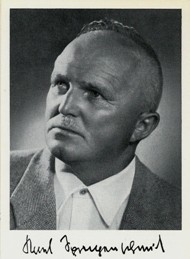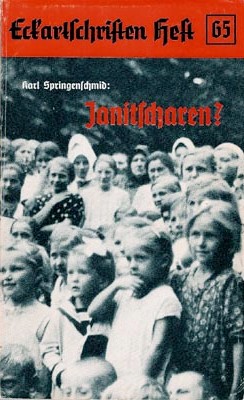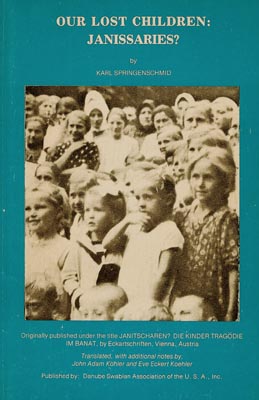Springenschmid, Karl (Pseudonyme: Christian Kreuzhakler, Beatus Streitter)
Banat Author

Born 1897 Innsbruck, Austria, died died in Salzburg on March 5, 1981.
Karl Springenschmid chose two Šumavans as the heroes of his “calendar” story, perhaps by chance. However, he is not just any author, although the pseudonyms Christian Kreuzhakler and Beatus Streitter, which he used, reveal something about his highly controversial starting points and peripetias of his life. Born on March 19, 1897 in Innsbruck, Tyrol, he attended the Teacher Training Institute in Salzburg (“Salzburg is the capital of Salzburg”, said Jaroslav Hašek), fought in the First World War, and found himself in Italian captivity from November 1918 to June 1919. He then worked in the federal state of Salzburg as a professional teacher.
Already in 1932 he joined the NSDAP, then illegal in Austria. Four years later, he was expelled from the Austrian school services due to “Great German” attitudes, but “anschluss” came of March 1938 and with it Springenschmid’s famous return to political prominence. In the same year, he became the head of the county office (Gauamtsleiter) for upbringing and education, in which he gained a terrible fame, among other things, by giving his pupils the impetus to burn “non-German” books. He named my beloved among their authors Stefana Zweiga (then still the inhabitants of the house on Capuchin Hill with a view opposite the Salzburg Castle, from where Nazism expelled him for racial reasons to faraway Brazil, where a great humanist chose his voluntary departure from life in the face of Hitler’s temporarily successful aspiration to conquer the world The Rooster Cross is also represented separately).
Springenschmid had that unfortunate date on April 30, 1938 (a commemorative plaque commemorating the site of a former Nazi event since 2007, directed primarily against “clerical and Jewish” literature, the first and only ever taken in occupied Austria, while in Germany it took place in 1933). more than 40 places!), which meant a break with the whole humanistic tradition of Central Europe, to put in one schoolboy a cry: “I throw a book of the Jew Stefan Zweig into the fire, that the flames engulf her like all Jewish scratches (Geschreibe). Stand up freely, pay attention, German spirit! “In 1939, he volunteered for the front at the beginning of the war, and when, after many field campaigns (the 2nd Mountain Division, operating in Norway, he later published a frequently mentioned book), he was defeated. Nazism, hiding in the German mountains to escape arrest and conviction until 1951.
He adopted the name Karl Bauer, made false personal documents and published under pseudonyms, and since 1956 he has lived in Salzburg-Elsbethen as a freelance writer and he also died in Salzburg on March 5, 1981. As a writer (from his school years he was a friend of the important later Austrian author Karel Heinrich Waggerl, about whom he published a 1978 book of memoirs), Springenschmid was extremely prolific. occupying the page in the new edition of the renowned literary lexicon for three other writers, is really so extensive that it is not even possible to mention it in the selection due to lack of space.
For all of them, let us mention the committee Die schönsten Erzählungen (ie The Most Beautiful Short Stories), which was compiled and presented in 1984 by Reinhard Pozorny with his preface. ~Innsbruck (A) / Český Krumlov / Želnava / Volary
SEE: www.dvhh.org/history/atrocities/Springenschmid-Lettang-pg41-53.htm


Janitscharen? Die Kindertragödie im Banat
By Karl Springenschmid – Published by Schutzverein Österr. Landsmannschaft (Wien), 1978
English Translation:
Our Lost Children: Janissaries?
Translated (additional notes)
by John Adam Kohler and Eve Eckert Koehler
Mass kidnapping by Communists of 20,000 children of ethnic Germans from Banat. Published by Eckartschriften, Vienna, Austria, was translated from German by John Adam Koehler and Eve Eckert Koehler under the title ‘Our Lost Children: Janissaries?’ (87 p.). The English edition was published in 1980 by the Danube Swabian Association of the U.S.A., Inc. Copies may be available from the University of Wisconsin – Milwaukee (where Ms. Koehler worked), through antiquarian sources, or via Inter Library Loan.
Last updated: 07/19/2025
